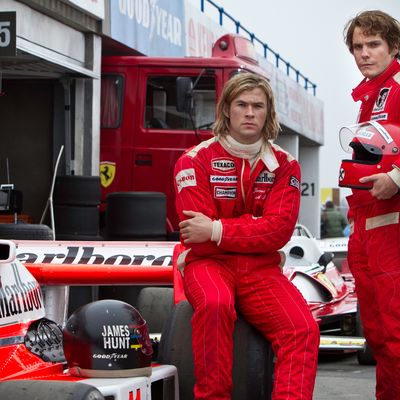
Ron Howard has made a masterpiece about how a dark-haired nerd and a blonde, long-haired free spirit changed each other’s lives. That movie was called Splash, but I’ll be damned if Rush doesn’t come close, too. This real-life story of the seventies rivalry between Formula One racers James Hunt (Chris Hemsworth) and Niki Lauda (Daniel Bruhl) may seem odd at first — Ron Howard, he of the softy prestige pictures, trying to do a big car race movie? — but it turns out to be perfect for the guy whose directorial debut was the low-budget chase comedy Grand Theft Auto and who has always loved playing with larger-than-life characters.
And larger-than-life they certainly are, or were: In one corner, Hunt, the party-loving Brit — “a great driver but an immortal fuck” — who drove and lived like each day would be his last. (He literally says that at one point in the film, because in a Ron Howard movie, no major theme is ever obvious enough.) In the other corner, Lauda, the methodical, driven Austrian who used statistics, precise engineering, and heavy preparation to give himself the best possible chance to win. Nobody would describe him as an “immortal fuck”; the closest his dialogue gets to sex is when he tells his future wife, “God gave me an okay mind, but an ass which can feel everything in the car.” (Keep his ass away from a New York City taxicab.) The rivalry between them flared up in the middle of the decade, climaxing with an insanely eventful 1976 Formula One circuit, where they trailed one another from international race track to international race track. It’s hard to believe it took Hollywood this long to get to them.
Not to state the obvious, but the movie is called Rush, not Nuance. Subtlety was never Howard’s game, and he abandons it entirely here, with occasionally ludicrous results: The owner of Hunt’s team is a Baron, Alexander Hesketh (Christian McKay), and he seems to be always decked out in an ascot and with a Champagne flute in one hand. When Lauda meets with his businessman father, they sit in a wood-paneled room with a fireplace, as dad, brandishing a cigar, says, “Do as I say and follow me into the family business!”
But this is a director who thrives on broad strokes, on playing with archetypes. That’s why, I think, he’s so often drawn to real-life stories — not because they convey the complexity of the world as we know it, but because they give him cover to bounce these capital-C Characters off each other: Whether it’s the introverted John Nash and his emotionally more open (and, it turns out, imaginary) roommate in A Beautiful Mind, or the haunted vampire Richard Nixon and his frivolous confessor David Frost in Frost/Nixon (which was written by Rush’s screenwriter, Peter Morgan). Heck, even Night Shift — not a real-life story, admittedly — is basically a two-hander between an anxious smartypants and a fun-loving wild man.
And so, too, is this enormously entertaining automotive epic, as Howard and Morgan intercut between the Hedonist and the Scrivener, and even allow them to narrate different parts of the film. It helps that both leads are up to the task of breathing life into their respective log-lines. Hemsworth has the harder task, because the movie is a little in love with him, and he has to justify that with his charisma; it would be too easy for him to become the Jock Who Gets Everything, and thus provoke our scorn. Bruhl has to do something different. With his insistent, reedy voice, his fake overbite, and his herky-jerky mannerisms, he has to bring Lauda down to the level of a clown and yet still earn our admiration and affection, without veering into pity. There are others in this cast, but who cares about them? Women merely get in the way: After a couple of nice scenes, Hunt’s wife, Suzy Miller (Olivia Wilde, doing a decent British accent), pretty much disappears. Meanwhile, Lauda’s wife, Marlene Knaus (Alexandra Maria Lara), gets one great introductory scene, but then just becomes more concerned, silent, cutaway fodder. These two guys don’t want women; they want each other.
Early on, Hunt opines that nobody really cares that they go around and around on a race course, that people (and, in his case, women) are drawn not to their driving but to their “closeness to death.” Lauda the risk-weary professional would disagree, but I’m not sure Howard the director would. The racing scenes in Rush are beautiful, exciting, and clear, but they traffic in danger — a cutaway to a wheel flying into the sidelines, a burnt-out wreck with a plume of smoke where a driver should be, etc. Danger, I suppose, and celebrity: Howard also cuts between the different languages of the international array of announcers, as if they were the bassline to the intoxicating music of fame. The spectacle is the thing here, and it adds to the danger. Near the end, addressing why a deadly course on a particularly rainy day isn’t being canceled, someone says, “The rights have been sold all over the world.” He might as well look at us in the audience and add, “Plus, there are all these people.” Rush satisfies our lust for both grand character combat and deadly gearhead spectacle.





